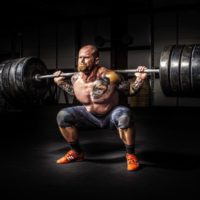Breaking Down Muscle-Building Myths, Part 1
What are the pervasive myths of modern bodybuilding?
Modern bodybuilding, just like any other sport, is mired by widespread misinformation or “myths” that can discourage a budding bodybuilder from pursuing his muscle-bound dreams.
If you are a beginner or if you’re thinking of joining the ranks of amateur or professional bodybuilders, it’s important that you arm yourself against these myths so you can focus on what really matters – developing your physique, building strength and improving your overall performance.
The First Set of Myths
1. “If You Stop Exercising, Your Muscles Will Melt and Transform Into Flab” – First of all, muscle tissue and fat tissue are two completely different things. Fat and muscle have a special relationship as fat can supply the body with energy for building muscle. However, to say that muscle can eventually “meld back” into fat is plain wrong.
This myth was probably derived by the naysayers from the common bodybuilding mantra “turn than fat into hard muscle”. Of course, we all know that this is just pure marketing language. The people who write such words on magazines and websites just want to encourage people to buy supplements or to sign up for a new weight loss system. It shouldn’t be taken literally!
If you take this mantra seriously, the logical reversal would be “turn that hard muscle into fat!” or something similar.
I can almost hear some of you saying “I’ve met someone who went to the gym for a while and stopped. He/she is fat now”. Well, yes this does happen but no because muscle transforms into fat but because people burn fewer calories than what they consume on a daily basis. The basic science behind calories is simple: if you eat 5,000 calories a day and you only burn off 1,500 calories, you will have an excess 3,500 calories.
If you don’t burn off the extra calories, the body stores the excess energy into fat. The body tries its best to distribute fat evenly but most of the time, a large percentage of fat ends up in a person’s midsection.
2. “You’ll Be Covered With So Much Muscle After Lifting Weights” – Building mass like professional bodybuilders requires tremendous effort. Some people are naturally big and that’s a plus if you’re going the “all natural” route. But for 99.99% of the competitive bodybuilding population, this is simply not the case; let’s leave it at that!
If you want to try bodybuilding because you want to become strong and lean then by all means, do it. If your diet is sensible and you have a certified trainer supporting your efforts, you will most likely end up lean and strong, just like you planned.
Another “muscle-bound myth” is that after gaining so much lean muscle mass, you won’t even be able to bend properly to perform common tasks. Some people even joke that a bodybuilder can lift 300 pounds but he can’t scratch his back anymore.
Again, there’s no truth at all with these myths. One of the strongest points of bodybuilding is the development of tremendous flexibility. If you watch professional bodybuilders warming you will be amazed at how easily a gargantuan bodybuilder can bend forward at the waist and stretch like a professional yoga instructor.
However, I do have to warn you about poor quality workouts. If you don’t perform repetitive movements properly, you can either damage your muscles or seriously compromise your flexibility. If you end up compromising your flexibility because you lack proper instruction or you were too preoccupied doing things “your way”, then the fault lies entirely in how you performed the exercises. We can’t possibly blame the activity of weight lifting and the sport of bodybuilding for the preventable faults of a few practitioners.
3. “You’ll Get Really Big But You’ll Become Very Weak in the Process” – There is a very harmful myth that has been circulating for many years now about competitive bodybuilders being “their weakest” during the few weeks leading to a major competition.
This may be due to the fact that professional bodybuilders perform “cut fatting” routines to ensure ideal form and this can truly deplete a person physically.
However, if you look at the situation logically the fatigue comes from too much effort and not because these people are bodybuilders. Some become somewhat weak because they train too hard – that’s not something that they should be criticized for.
Also, it is exceedingly common for pro-level bodybuilders to be able to bench press half a ton of weights. Ronnie Coleman can easily curl 200+ dumbbells in his “warm up” routines!



